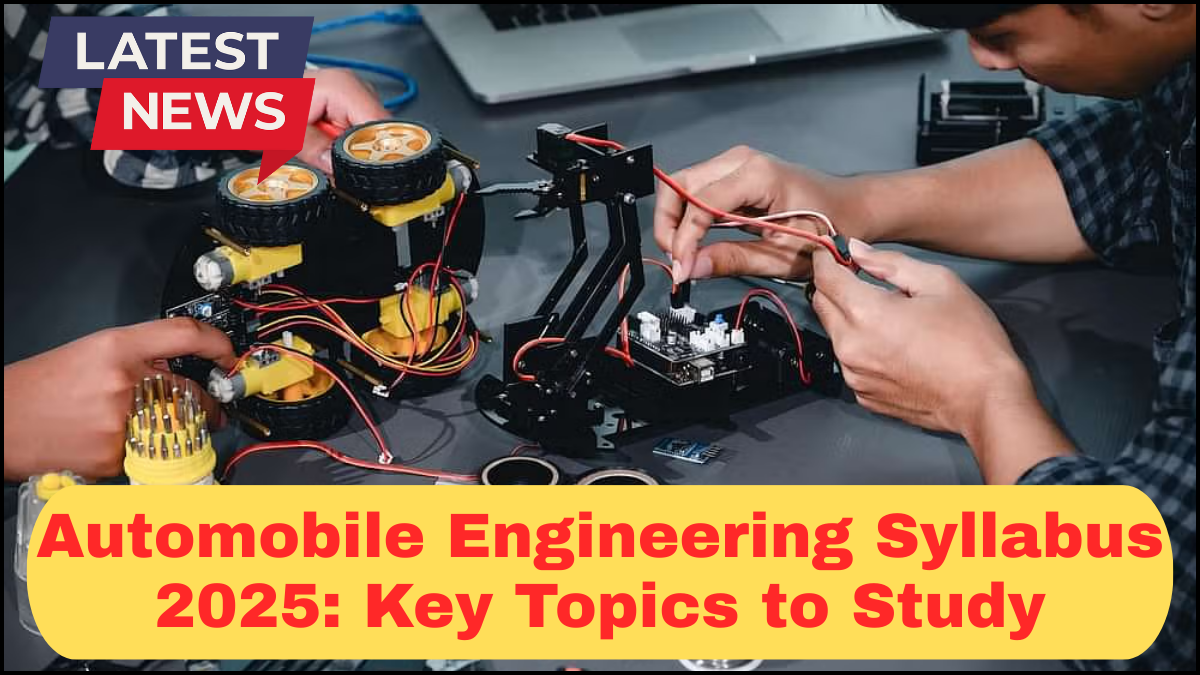The Auto Engineering syllabus for 2025 has been updated to align with emerging technologies, sustainability goals, and real-world industry demands. With the rapid shift toward electric mobility, intelligent systems, and automation, the curriculum is no longer limited to just engines and mechanical components. Instead, it reflects a multidisciplinary approach that prepares students for the challenges of modern transportation engineering.
Whether you’re mapping out your university journey or planning your exam prep, understanding the structure of this updated university curriculum is essential. Below, we break down the core and elective topics in detail.

Core Subjects in the Auto Engineering Syllabus
1. Engineering Thermodynamics
A foundational subject, thermodynamics in the 2025 syllabus goes beyond theoretical laws. It includes applied cycles used in internal combustion engines and hybrid systems. Students learn about energy transformations, efficiency calculations, and emerging trends in sustainable energy use within vehicles.
2. Automotive Engines
This topic covers both conventional and alternative propulsion systems. Emphasis is placed on spark ignition (SI) and compression ignition (CI) engines, performance analysis, emission control technologies, and recent developments in hydrogen and biofuel-powered engines.
3. Vehicle Dynamics
Understanding how a vehicle behaves on the road is critical. This module introduces suspension geometry, steering dynamics, ride comfort, and handling characteristics. Simulation-based tools like MATLAB and Adams Car are integrated into the learning process.
4. Automotive Transmission Systems
Here, students study manual and automatic transmission design, gear ratios, clutch dynamics, torque converters, and dual-clutch systems. The module also explores how modern CVTs and electric drivetrains are transforming traditional powertrain layouts.
5. Electric and Hybrid Vehicles
With the automotive industry shifting toward electrification, this subject has become central in the auto engineering syllabus. It includes battery management systems (BMS), regenerative braking, power electronics, and electric motor design. Case studies on leading EV models provide real-world context.
Specialized Topics & Electives
1. Automotive Electronics and Embedded Systems
This area explores the integration of sensors, actuators, microcontrollers, and control algorithms. Topics include vehicle networks (CAN, LIN), ADAS (Advanced Driver Assistance Systems), and the basics of autonomous driving systems.
2. CAD and Vehicle Design
Students are trained in industry-standard design tools such as CATIA, SolidWorks, and AutoCAD. The focus is on modeling complete vehicle assemblies, from chassis to bodywork, while incorporating ergonomic and aerodynamic considerations.
3. Emissions and Environmental Impact
Addressing global climate concerns, this module emphasizes emission norms (BS-VI, Euro 6), after-treatment technologies like catalytic converters and DPFs, and the role of vehicle electrification in reducing carbon footprints.
4. Automotive Materials and Manufacturing
Covering lightweight materials such as composites, aluminum alloys, and high-strength steels, this subject also dives into production techniques like die-casting, robotic welding, and 3D printing applications in automotive prototyping.
Industrial Training & Project Work
Most universities mandate internships or industry projects as part of the auto engineering syllabus. These opportunities expose students to practical challenges in design, testing, and manufacturing. Final-year projects often involve developing innovative solutions such as low-cost electric vehicles or smart vehicle monitoring systems.
Exam Prep Tips for Auto Engineering Students
-
Understand the Concepts: Focus on the fundamentals before diving into complex topics. Core subjects like thermodynamics and vehicle dynamics are crucial.
-
Use Simulations: Tools like ANSYS, MATLAB, and Simulink are increasingly important. Practice using them to simulate real-world automotive problems.
-
Refer to Updated Texts: Use current textbooks and journals that reflect the 2025 university curriculum changes.
-
Solve Previous Papers: Analyzing question trends helps in effective exam prep.
-
Group Discussions: Collaborating with peers helps in understanding practical applications and clears conceptual doubts.
FAQs: Automobile Engineering Syllabus 2025
Q1: What is the major focus of the 2025 Auto Engineering syllabus?
The syllabus emphasizes sustainable technologies, electric mobility, and intelligent automotive systems alongside traditional mechanical concepts.
Q2: Are software skills important in this curriculum?
Yes. Students are expected to be proficient in CAD tools, MATLAB, Simulink, and vehicle simulation platforms to meet industry demands.
Q3: Is industry training included in the syllabus?
Most programs include internships, industrial visits, or final-year projects in collaboration with automotive firms.
Q4: How can I best prepare for exams in auto engineering?
Start with mastering core subjects, integrate simulation practice, review the latest developments in vehicle technology, and solve previous years’ papers.
Q5: Does the syllabus cover autonomous vehicles?
Yes, emerging topics like ADAS, sensor integration, and embedded systems related to autonomous driving are included as elective or specialized modules.
click here to learn more